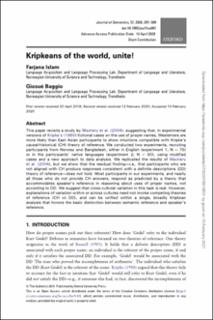| dc.contributor.author | Islam, Farjana | |
| dc.contributor.author | Baggio, Giosuè | |
| dc.date.accessioned | 2021-02-17T14:13:15Z | |
| dc.date.available | 2021-02-17T14:13:15Z | |
| dc.date.created | 2019-10-29T14:05:22Z | |
| dc.date.issued | 2020 | |
| dc.identifier.citation | Journal of Semantics. 2020, 37 (2), 297-309. | en_US |
| dc.identifier.issn | 0167-5133 | |
| dc.identifier.uri | https://hdl.handle.net/11250/2728722 | |
| dc.description.abstract | This paper revisits a study by Machery et al. (2004), suggesting that, in experimental versions of Kripke’s (1980) fictional cases on the use of proper names, Westerners are more likely than East Asian participants to show intuitions compatible with Kripke’s causal-historical (CH) theory of reference. We conducted two experiments, recruting participants from Norway and Bangladesh, either in English (experiment 1; N = 75) or in the participants’ native languages (experiment 2; N = 60), using modified cases and a new approach to data analysis. We replicated the results of Machery et al. (2004), but we show that the residual finding—i.e., that participants who are not aligned with CH produce responses consistent with a definite descriptions (DD) theory of reference—does not hold. Most participants in our experiments, and nearly all those who do not provide CH answers, respond as predicted by a theory that accommodates speaker’s reference in reasoning about uses of proper names, not according to DD. We suggest that cross-cultural variation in this task is real. However, explanations of variation within or across cultures need not invoke competing theories of reference (CH vs DD), and can be unified within a single, broadly Kripkean analysis that honors the basic distinction between semantic reference and speaker’s reference. | en_US |
| dc.language.iso | eng | en_US |
| dc.publisher | Oxford University Press | en_US |
| dc.rights | Navngivelse 4.0 Internasjonal | * |
| dc.rights.uri | http://creativecommons.org/licenses/by/4.0/deed.no | * |
| dc.title | Kripkeans of the world, unite! | en_US |
| dc.type | Peer reviewed | en_US |
| dc.type | Journal article | en_US |
| dc.description.version | publishedVersion | en_US |
| dc.source.pagenumber | 297-309 | en_US |
| dc.source.volume | 37 | en_US |
| dc.source.journal | Journal of Semantics | en_US |
| dc.source.issue | 2 | en_US |
| dc.identifier.doi | 10.1093/jos/ffaa001 | |
| dc.identifier.cristin | 1741714 | |
| dc.description.localcode | © The Author(s) 2019. Published by Oxford University Press. This is an Open Access article distributed under the terms of the Creative Commons Attribution License (http:// creativecommons.org/licenses/by/4.0/), which permits unrestricted reuse, distribution, and reproduction in any medium, provided the original work is properly cited. | en_US |
| cristin.ispublished | true | |
| cristin.fulltext | original | |
| cristin.qualitycode | 2 | |

